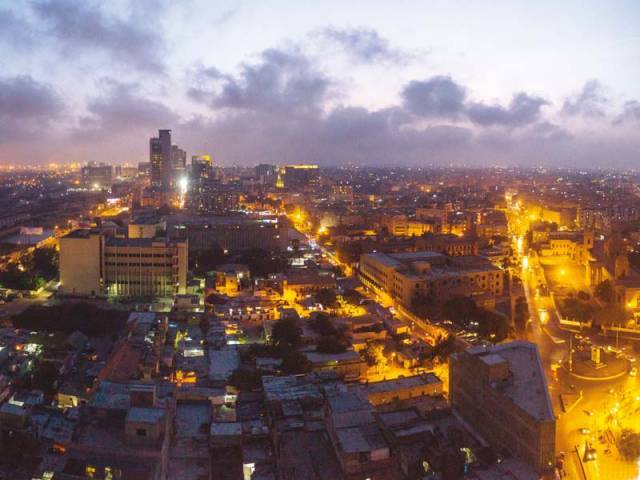
Kamal's party, the Muttahida Qaumi Movement (MQM), has once again claimed victory in the December 2015 local government elections which were held for the first time since his tenure ended in 2010. The MQM won 137 of 209 union committees (UCs) in all six districts of the city -- a clean sweep.
With the people’s mandate in hand, the question remains: will the MQM fare better this time in terms of political authority?
Not if the provincial government has its way. Compared to the Local Government Ordinance 2001 which provides district nazims with administrative and policing powers, experts say administration under the Sindh Local Government Act 2013 (SLGA 2013) is not as empowered and the devolution of power stands disputed.
Transport, water, garbage collection and town planning or approval of new buildings are not in the hands of the city administration anymore.
From the Sindh Building Control Authority to the Sindh Solid Waste Management Board, and from Sindh Transport and Mass Transit Department to the Karachi Water and Sewerage Board, the power to make decisions lies with the provincial government.
“There are many cities in the world where there is multiple ownership of land, and its management, it is not such that everything is under the mayor,” architect and urban planner Arif Hassan tells The Express Tribune. “But a mechanism is formed on how to work together. Here, there is no such mechanism. Essential powers are being centralised.”
Stand-off imminent in Sindh
A report on current local government system by economist Akbar Zaidi et al, titled Local Government Structures and Creating Space for Women in Pakistan, states that the functions of these bodies in most cases are limited to municipal and civic amenities, and supporting the provincial government. In fact, Sindh local bodies have limited role of councils for supervision, monitoring and regulation in core service delivery areas, such as health, education, water and sanitation.

No financial devolution
Similarly, no matter how ambitious or limited the mandate of the local government, no system would function without a financial package, especially resource generation.
“Local governments neither have the financial resources nor the capacity to raise them. Without financial devolution and capacity-building at the local government level, it is clear that many of the tasks assigned to local government will be dependent on financial resource transfers from the provincial governments. This is not decentralisation in the true spirit of the term,” the report concludes.
“The revenue will be transferred by the federal and provincial government on their own discretion. If they like you, they will. Else, they may not,” says Arif Hassan.
The UNDP report on local governments, titled Local Government Acts 2013 and Province-Local Government Relations, states that the “…[SLGA 2013] provides limited autonomy to local councils in terms of fiscal management and control over service delivery, revenue, tax and police departments.”
Local councils would receive allocations through the respective Provincial Finance Commission Awards, having limited powers to impose taxes or exercise regulatory functions, it added.
“Though the local governments are deprived of their powers, they are expected to fulfill their responsibilities,” says Leader of the Opposition in the Sindh Assembly Khawaja Izharul Hasan in an interview with The Express Tribune.
“The situation is worse in Sindh," he adds.
The MQM, in its pursuit to restore the powers of local government representatives, has submitted amended bills in the Sindh Assembly, organised protests, and is also planning to moving the Supreme Court.
“When the Supreme Court can force the government to hold elections, it can also [make the government] grant the powers,” says the opposition leader. “Provincial governments are obliged to legislate and introduce mega projects. It is the local governments, which look after municipality.”
Sindh’s minister for local government claims, however, all essential powers have been given to civic agencies.
“All powers are in line with the 1979 local government act, and similar laws have been enacted in all provinces,” says Jam Khan Shoro. “The MQM contested the elections under the same law and should not object.”
Commenting on the 2001 local government law, the minister says, “Extra powers were given by a dictator [Pervez Musharraf] after bypassing Parliament. This cannot happen now.”
Hasan, on the other hand, says federal agencies have large tracts of land, and unless they come under the planning parametre, Karachi’s issues won’t stand resolved.
“The Karachi Development Plan 2000 had a Karachi division physical planning authority, which outlined a plan for the coordination of all these institutions,” he says. “However, the plan did not materialise and could not be made into law. It remained a proposal.”
“Municipal powers should be with one authority so that it could serve across the board,” adds the MQM leader. Otherwise, he says, the mayor will not be able to answer each and every issue of Karachi.
The two main political parties of Sindh – Pakistan Peoples Party (PPP) and MQM – need to reach common ground on the matter, which for now seems to be a distant dream.
The importance of Karachi
While the ‘rural’ PPP has to its advantage a highly centralised system, it has failed to have majority representation in the city, and the Urdu-speaking MQM cannot control the city unless there is a highly decentralised system in place.
“Has there been any improvement in Sindh during the last seven years that we let them continue like this,” the Sindh opposition leader points out. “We will resist them and fight back for our rights through legal, constitutional and democratic means.”
Hasan says, “Both parties want Karachi’s revenues, and its control.”
He adds, “The existing stakeholders aren’t willing to give up their power. They are more concerned about their constituencies than the city.
“These things can be settled with new institutional arrangement,” he says. And what’s required for that? “Uske lye pyar or mohabbat chahye.”
1672385156-0/Andrew-Tate-(1)1672385156-0-405x300.webp)
















COMMENTS (5)
Comments are moderated and generally will be posted if they are on-topic and not abusive.
For more information, please see our Comments FAQ